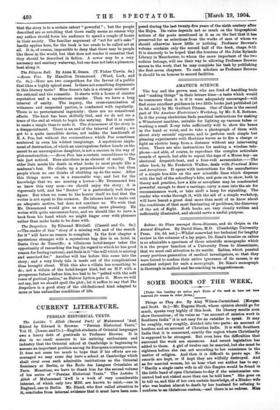The Filigree Ball. By Anna K. Green. (T. Fisher 17nwin.
6s.) —Boom Five. By Hamilton Drummond. (Ward, Lock, and Co. 6s.)—Here are two competitors for the favour of a public that likes a highly spiced meal. Is there not something degenerate in this literary taste ? Miss Green's tale is a strange mixture of the rational and the romantic. It starts with a house of sinister reputation and a mysterious murder. Then we have a long interval of sanity. The inquiry, the cross-examination of witnesses and suspected parties, is conducted with regularity. There is no preternatural ingenuity ; there are no sensational effects. The knot has been skilfully tied, and we do not see a trace of the end at which to begin the untying. But it is easier to make a tangle than to undo it. The denouement of the story is a disappointment. There is an end of the interval of sanity ; we get to a quite incredible device, not unlike the handicraft of E. A. Poe, but without the vraisemblance which Poe sometimes contrived in even his wildest imaginings. A mysterious imple- ment of destruction, of which an unscrupulous father hands on the secret to an unscrupulous daughter, is not a success in the way of plot-construction.—Room Five has a certain resemblance to the tale just noticed. Here also there is an element of sanity. The elder Dale meets his death in what looks to most people like a madman's feat. He climbs up a perpendicular rock; but then people whom no one thinks of shutting up do the same. After this things move on in a reasonable way, and but for the knowledge that we are nearing a horror—Mr. Drummond lets us know this very soon—we should enjoy the story ; it is vigorously told, and the " Doctor " is a particularly well drawn figure. But when we come to the horror itself we feel that the writer is not equal to the occasion. He labours hard to make out an adequate motive, but does not convince us. We wish that Mr. Drummond would give us something more pleasing. He writes with quite uncommon force, and we should like to have a book from his hand which we might linger over with pleasure rather than make haste to be done with.










































 Previous page
Previous page